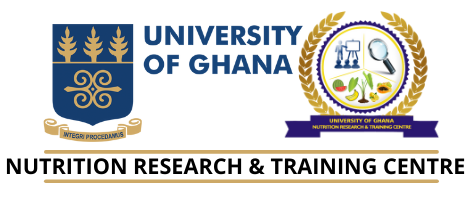Dr. Carmelle Mizéhoun Adissoda
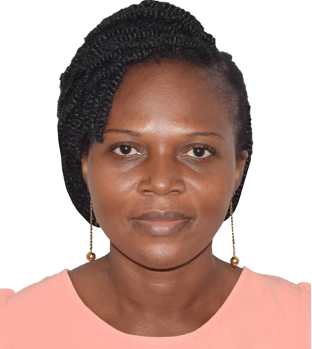
Dr. Carmelle Mizéhoun Adissoda is a Lecturer at the School of Nutrition and Dietetic/ Faculty of Health Sciences at the University of Abomey-Calavi (UAC). After her Pharmacy’diploma at University of Cheikh Anta Diop (UCAD), Senegal, Dr. Mizéhoun A. continued her studies in nutrition (Master’s degree in human nutrition) convinced of its importance as a determinant of the health status of populations and an important factor of development. She also holds a PhD in Public Health/Nutrition and a university diploma in Clinical Research from the University of Limoges-France. Her work focuses on levels of intake of micronutrients (Iodine, sodium, potassium, vitamin D) and their relationship with the nutritional status of populations; the development and validation of tools for assessing food consumption and nutritional status in the black population; food and nutritional risk factors for non-communicable diseases (glycemic index of local foods, obesity, and determinants). As a QES scholar, Carmelle will collaborate with World Vision, Ghana as her Research Placement Partner. She will contribute to a project that underlines the strategies which could address inequity in young child undernutrition in Ghana.
Patience Atitsogbey
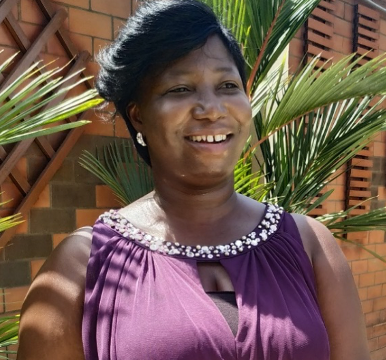
Patience Atitsogbey is a PhD Candidate at the Department of Nutrition and Food Science (NFS), University of Ghana (UG), Legon, under the supervision of Prof. Matilda Steiner-Asiedu and her doctoral supervisory committee members Prof. Agnes Budu (NFS, University of Ghana), Dr Emmanuel Kyereh (CSIR- Food Research Institute, Ghana) and Dr. George A. Annor (University of Minnesota, USA). Her doctoral research aims to explore and measure the effect of nutrition education on consumer behaviour towards using green leafy vegetables and legumes among households in the Accra Metropolitan Area and its linkage to iron and haemoglobin levels. The results will aid in nutrition policy planning and programming for poor communities in the Accra Metropolitan Area and Ghana. Patience has a Bachelor of Science degree in Community Nutrition from the University for Development Studies, Tamale and an MPhil in Nutrition from the University of Ghana, Legon. She also holds a certificate in Food Systems Transitions from the University of Stellenbosch, Institute of Sustainability, South Africa, and a food safety and nutrition certificate from the University of Leeds, UK. She is a Fellow of the African Climate Change Adaptation Initiative (ACCAI) and a UG- Nestle Scholar. Patience has gained her experience over the years by working and researching in poor communities in Ghana on nutrition, food security and climate change, food safety, and health. She aims to improve food and nutrition security and the overall health of households, specifically targeting men, women, adolescents’ girls, and children. As a QES Scholar, she aims to improve her research skills in quantitative and qualitative data analysis, enhance her leadership capacity, and acquire knowledge and skills to improve households’ livelihood in poor Ghanaian communities, which will be extremely useful for her research and future work. Patience looks forward to using this opportunity to network and collaborate with other researchers working in nutrition and health both locally and internationally. As a QEScholar, Patience will be collaborating with World Vision Ghana as her Research Placement Partner to develop a policy brief on strategies needed to address inequity in young child undernutrition in Ghana.
Dr. Alex Boadi Dankyi

Dr. Alex Boadi Dankyi is a Research Fellow at the University of Cape Coast (UCC) in Ghana. He holds a Ph.D. in Management Science and Engineering from Jiangsu University, China and a Master in Human Resource Management from the University of Cape Coast (UCC). He is interested and has extensively researched Developmental Economics, specifically in Human Capital Development, Human Resource Management, Quality of Health Services, Energy Economics, and Organizational Innovation. He notes that community development remains a crucial component of the national development agenda and a sharpened tool for developing countries to reduce poverty gaps. Also, health and education are the most widely used proxy determinants of human capital development and, by extension, community development. As an early career researcher with a focus on developmental economics, specifically human capital development, energy economics and, by extension, community development, the QES-WA will allow him to collaborate with experts in health and education to improve his competencies in human capital development and community development.
Michael Akenteng Wiafe

Michael Akenteng Wiafe is an assistant lecturer at the Department of Nutritional Science, University for Development Studies (UDS), Tamale-Ghana. Michael holds a BSc in Community Nutrition (UDS) and MPhil in Human Nutrition and Dietetics (Kwame Nkrumah University of Science and Technology, KNUST, Kumasi-Ghana). He is a final year PhD Candidate at KNUST investigating the effect of nutrition education and counselling on adolescents’ dietary iron intake and iron status in Ghana. His research focus includes micronutrients, malnutrition, dietary patterns, dietary management and prevention of chronic diseases, therapeutic food development, nutrition in pregnancy, childhood, and adulthood. As an innovative young researcher, the QES will allow him to collaborate and network with astute and top-notch researchers in nutrition, agriculture, and other disciplines. Michael believes the best way to reverse the consequences of nutritional deficiencies and reduce poverty is to eat what we grow and grow what we eat locally. Value addition to agricultural produce is a prerequisite for entrepreneurship and community development. As a QES scholar, Michael will be collaborating with Densu Associates as his Research Placement Partner (RPP). He will review institutions and organisations focused on promoting education, skills/training and/or employment with particular attention to gender, disability and youth in the agriculture sector of Ghana. Michael will help produce a research report detailing opportunities and barriers that women, especially young women aged 15 to 35 years of diverse backgrounds (young married people, widowed, people with disabilities, displaced youth, etc) face in Agriculture in Ghana.
Benedicta Asare
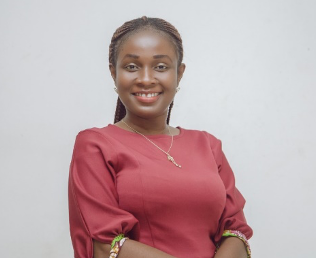
Benedicta Asare is currently a Ph.D. Candidate at the Department of Human Nutrition and Dietetics, Kwame Nkrumah University of Science and Technology (KNUST) under the supervision of Prof. Reginald Adjetey Annan and Dr. Erick Herman Lutterodt. Her doctoral research aims to explore and understand the drivers of post-harvest losses of fruits and vegetables along the value chain and its linkage to the nutritional status of women and children. Her results are aimed to inform the development of tailored interventions to reduce food waste at the household level by educating and training mothers on preservation methods for fruits and vegetables to reduce anaemia among women and children. Benedicta completed her Bachelor’s in Dietetics and Master’s in Public Health at the University of Ghana (UG). She also has a certificate in Policy Planning and Development and Leadership and Management in Health from the University of Washington. Over the years, she has built her experience working within urban and rural communities on issues related to the health and nutrition of women and children. Benedicta’s career goal is to work with local and international organisations as an academic researcher to provide research-based interventions and policy formulation modalities in nutrition and public health to vulnerable groups in society, most especially women. Through this training, she hopes to acquire leadership and capacity building skills in women’s health, nutrition, and agriculture as well as identify conditions and best practices that will help foster successful partnerships between researchers, institutions, and policymakers. She also hopes to use this opportunity to connect and build networks with people working in the field of gender and women’s empowerment both locally and internationally for her future work. As a QEScholar, She will be collaborating with her Research Placement Partner (RPP), World Vision, Ghana, a Christian relief, development and advocacy organization dedicated to working with children, families and communities especially vulnerable people to overcome poverty and injustice. Her research objective will answer the question of “Gender inclusion strategies in mainstreaming nutrition into agriculture investments”. She hopes to use the opportunity to build networks with people working in the field of nutrition, child and maternal health both locally and internationally for future collaborations.
Tapsoba Viviane Aurélie
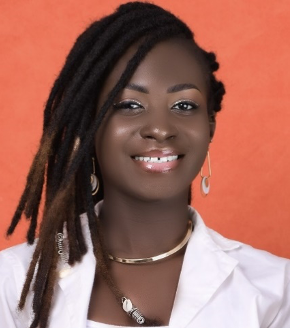
Tapsoba Viviane Aurélie is a nutritionist in her second year of a doctorate at the Joseph Ki Zerbo University (UJKZ) in Ouagadougou, Burkina Faso, under the supervision of Dr. Ella Compaoré. Aurélie’s research thesis focuses on analysing public policies and government actions for a healthy food environment in Burkina Faso. This research project will provide indicators and information to guide public nutrition policies in Burkina Faso. Aurélie holds a bachelor’s degree in agri-food obtained in Burkina Faso, a master’s degree in nutrition and food security obtained at the Felix Houphouet Boigny University in Abidjan. While conducting her research thesis on nutrition policies, she began her career as a nutritionist at the Gaoua Regional Hospital Center, Burkina Faso. She enjoys helping patients have better nutrition and food habits, which is part of her entrepreneurial project for her community. The QES program will hone her leadership, research, and interpersonal skills, which will be extremely important in her career as a research nutritionist and enable her to make critical decisions to improve nutrition and nutrition policies.
Dr. Coulibaly Wahauwouélé Hermann
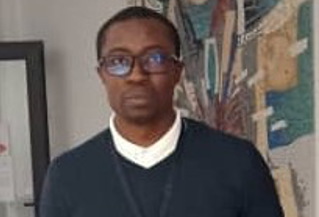
Dr. Coulibaly Wahauwouélé Hermann holds a Ph.D. in Biotechnology and Food Microbiology from the University Nangui Abrogoua (UNA), Abidjan, Ivory Coast. Since 2017, He has been a researcher at the Biotechnology and Food Microbiology laboratory in the Department of Food Science and Technology, University Nangui Abrogoua. Hermann’s doctoral research examined how to improve the quality of local beer produced from sorghum. Currently, his research focuses on probiotics and the valorization of agricultural by-products. He is a recipient of the post-doctoral research award of Agence Universitaire de la Francophonie (AUF) and the Romanian government; Eugen Ionescu in 2021 for post-doctoral research at the University of Agronomic Science and Medicine Veterinary of Bucarest, Romania. He holds certificates in sustainable development and project management. As a QEScholar, Hermann hopes to enhance his capacity in community-based research and develop his network with other researchers. As a QEScholar, Hermann will be collaborating with his Research Placement Partner (RPP), World Vision, a global non-profit organisation whose mission is to reduce gender inequality through the inclusion of gender in all areas of activity and to fight malnutrition in all its forms to contribute to poverty reduction. He will develop his skills in quantitative and qualitative survey data analysis and also have the tools to empower women and gender in the Ghanaian context. He hopes to use the opportunity to establish links and networks with people working in the field of gender, women’s empowerment and nutrition both locally and internationally, for his future work.
